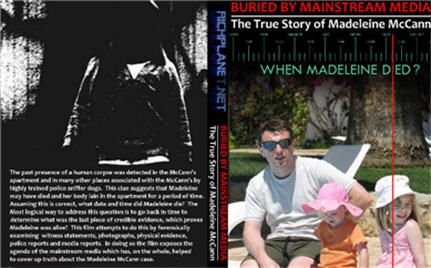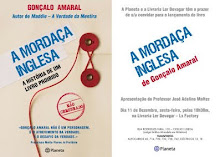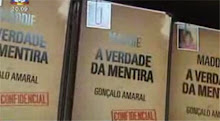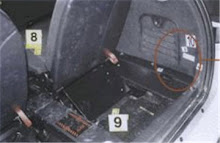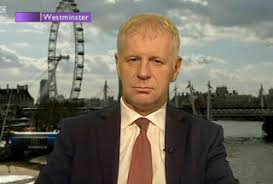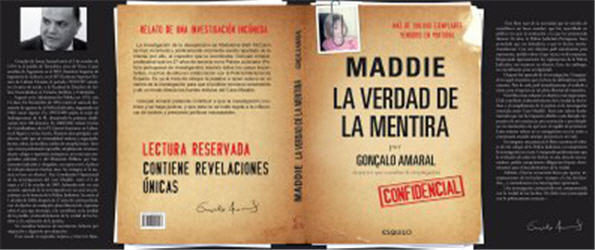First in Portuguese, then in English.
30.9.21
25.6.19
Gonçalo Amaral: "Maddie: The Truth of the Lie"
This 'censored-in-UK' book by Gonçalo Amaral has been translated into English by AnnaEsse and reproduced here, with permission, to help increase the chances of it being read by people in the UK.
This blog is dedicated to Gonçalo Amaral and his ongoing investigation into the mysterious disappearance of three year old British citizen, Madeleine McCann.
Acknowledgments: AnnaEsse, Joana Morais, Nigel Moore, Pamalam, Tony Bennett, Richard D. Hall, retired police Superintendent Peter Macleod and the numerous members 'The Complete Mystery of Madeleine McCann' forum, and those who have worked tirelessly and voluntarily to translate the official Portuguese police files, to raise awareness of this case so that the truth of what happened to Madeleine can be known - and justice served upon her.
*****
Table of Contents:
Madeleine McCann: The Forbidden Investigation
Foreword The forbidden investigation
Chapter 1 Precipitation? Certainly not.
Chapter 2 Madeleine Beth McCann's holiday
Chapter 3 Announcement of a disappearance
Chapter 4 The real victim is the missing child
Chapter 5 The days that followed
Chapter 6 The arrival of the English police
Chapter 7 Suspicious behaviour and contradictions
Chapter 8 A man with a child in his arms
Chapter 9 Majorca, September 2005
Chapter 10 Rethinking the facts
Chapter 11 Analysis of a crime scene, apartment 5A
Chapter 12 A rather weak monitoring system
Chapter 13 Contradictions or clues
Chapter 14 Madeleine's parents call attention to her death
Chapter 15 Memory of a crime
Chapter 16 The hypothesis of death is considered
Chapter 17 In the McCanns' bedroom
Chapter 18 Preparation for the interrogations
Chapter 19 Towards placing the McCann couple under investigation
Chapter 20 An Irish family in a state of shock
Chapter 21 The removal of the coordinator of an investigation. Conspiracy or servilism?
Chapter 22 At the Ria de Alvor, one year later, looking at the past with confidence in the future.
"Sometimes the only difference between justice denied and justice served is one wet, black nose"
The Truth of the Lie Documentary
Clarence Mitchell: “I doubt that anyone around here is interested in watching it and the station that broadcasts it will be sued by our lawyers!”
Narration courtesy of 'frangendapenik', The 3 Arguidos
Update
Gonçalo Amaral, the former coordinator of the Madeleine McCann investigation, has contacted the editor of his book, “Maddie: The Truth About The Lie”, seeking to recover its copyright, with the ultimate purpose of publishing the book in the UK himself.
Based on the criminal investigation into the disappearance of Madeleine, “The Truth About The Lie” has sold over 200 thousand copies in Portugal, and has been translated and published in several countries, like France, the Netherlands, Germany, Denmark, Spain and Belgium.
A documentary that is based on the book was broadcast by TVI in Portugal and reached an audience of 2,2 million viewers, was sold and broadcast in other countries, like Spain and Denmark, where it generated added interest in the case.
"The Truth About The Lie" has not been published in the UK, where no editor seems to be willing to risk upsetting the McCann couple.
Similarly, the documentary has not been broadcast by any British television channel.
Many British citizens have been forced to search for, and watch, the documentary on the internet, in order to access factual information that has otherwise not been made available by the UK media, in general.
Source: Joana Morais
-----
'We trust in justice and this does not end here.'
'We trust in justice and this does not end here.'
Gonçalo Amaral 22-5-09
23.6.09
Madeleine McCann: The Forbidden Investigation
The French title of Gonçalo Amaral's book, "A Verdade da Mentira," is, "Maddie: L'Enquête Interdite," The Forbidden Investigation.
This is the Foreword from the French version translated by AnnaEsse.

Certainly, this book responds to the need I felt to defend myself, having been discredited by the institution for which I worked for more than twenty-six years, without being given any chance to explain myself, publicly or within the institution itself. I made the request several times, but it was never heard. I, therefore, scrupulously respected the rules of the police judiciaire and I refrained from making any comment. But this goes without saying: I experienced that silence to which I was constrained as an attack on my dignity. Later, I was removed from the investigation. It was then that I understood that it was time to speak. To do that, I requested early retirement in order to be able to express myself freely.
22.6.09
Chapter 1: Precipitation? Certainly not.
 From the work of Gonçalo Amaral translated by AnnaEsse
From the work of Gonçalo Amaral translated by AnnaEsseChapter 1
Precipitation?
Certainly Not.
FEBRUARY 2008, NINE MONTHS AFTER MADDIE’S DISAPPEARANCE.
IT’S CARNIVAL SUNDAY. In the distance the shots of the hare hunters can be heard, resounding above the low-growing vegetation of the Barrocal.
On waking, I decide to stay at home. Recently, I’ve had no wish to go out, to go walking or to meet people. I yearn instead for peace and silence. That morning, the sun was shining, promise of a lovely day: but in the afternoon, the rain began to fall, ruining the fête and the parades.
From the window I admire the Algarve countryside: the pink and snowy-white of the almond trees contrasting with the blue of the sea that is glimpsed in the distance. Suddenly, the ringing of the telephone – more and more unusual of late – brings me out of my lethargy; I have to face reality.
21.6.09
Chapter 2: Madeleine Beth McCann's holiday

MADELEINE BETH McCANN'S HOLIDAY
Saturday April 28th
At the end of April 2007, it's spring in the Algarve, even if the weather is particularly gloomy. It rains often. While the sun shines, the temperature becomes pleasant, but the nights are cold and windy.
On the morning of April 28th, Madeleine, aged 3, goes to Leicestershire airport to board a flight for Faro, accompanied by her parents, Gerald McCann and Kate Healy, both 39, doctors, living in Rothley, England, and by her brother and sister, Amelie and Sean, twins aged 2.
The family is taking a short holiday - one week - until the following Saturday, May 5th. Madeleine seems at the same time happy and anxious. In Faro, where she arrives at around 2pm, she boards the minibus provided for tourists by the tour operator, to travel the 70 kilometres that separate her from her destination: the Ocean Club holiday complex at Vila da Luz, not far from the town of Lagos.
20.6.09
Chapter 3: Announcement of a disappearance: The first seventy-two hours

ANNOUNCEMENT OF A DISAPPEARANCE: THE FIRST SEVENTY-TWO HOURS
On this evening, May 3rd 2007, I decide to dine at the Carvi Brasserie, in the centre of Portimão, before going home. I have been living for a year in this town, where I lead the Department of Criminal Investigation of the police judiciaire. In 1982, when I was 23 and I had just taken up this career, I had already gone there. There, I had made the acquaintance of someone who was to become my friend, Manuel João. Former local official and sporty, a charismatic person. He always lent a hand to members of the police judiciaire who went to the town for the purposes of an investigation. As an elected local official, he originated the creation of a police judiciaire department in Portimão. Thus, that evening, while savouring fruits de mer, we discuss the problems of Portuguese society.
19.6.09
Chapter 4: The real victim is the missing child

THE REAL VICTIM IS THE MISSING CHILD
In a criminal investigation, knowledge of the victim is essential. A physical description is not enough. Her personality, her habits, other interests, her family background and her friendships allow a better understanding of the conditions in which the crime was committed. Knowing about her actions and her movements before her disappearance or her death also helps to determine the motive for the crime. The work is made easier when it's about an adult person with real life experience. When the victim is a child, the information becomes more piecemeal, and it's not easy to define a still evolving personality. All the information about her comes from her parents, her family, their friends, employees, neighbours and sometimes educators. It's not her actions that speak for her, but other people.
According to statistics, including Great Britain, parents and close relatives are involved in the majority of cases of missing children. Certainly that does not constitute proof. A common sense rule, however, says doubt their word, without this meaning that they are to be considered as suspects. The information they provide must be cross-checked against other witness statements, in order to evaluate their veracity and credibility. The public in general, deeply touched by the misfortune that has befallen the family - they can all easily imagine the anxiety and pain that a mother or a father must feel in such a situation - take their side right away. The investigator, however, cannot lose sight of his objectives. He has to devote all his efforts to the discovery of the truth in order to bring justice to the only true victim: the child.
DISAPPEARANCE AND CRIME
In disappearance cases, the first hypothesis to be considered is that of a voluntary departure. An appeal for witnesses, accompanied by a detailed description, is then issued. Searches are organised immediately, mobilising all the available resources: police forces, civil population, sniffer dogs, announcements in the media... In parallel, the investigator must not rule out the possibility of a crime. The three basic questions to which he must find answers are as follows: what happened? where did it happen? why?
Subscribe to:
Posts (Atom)





